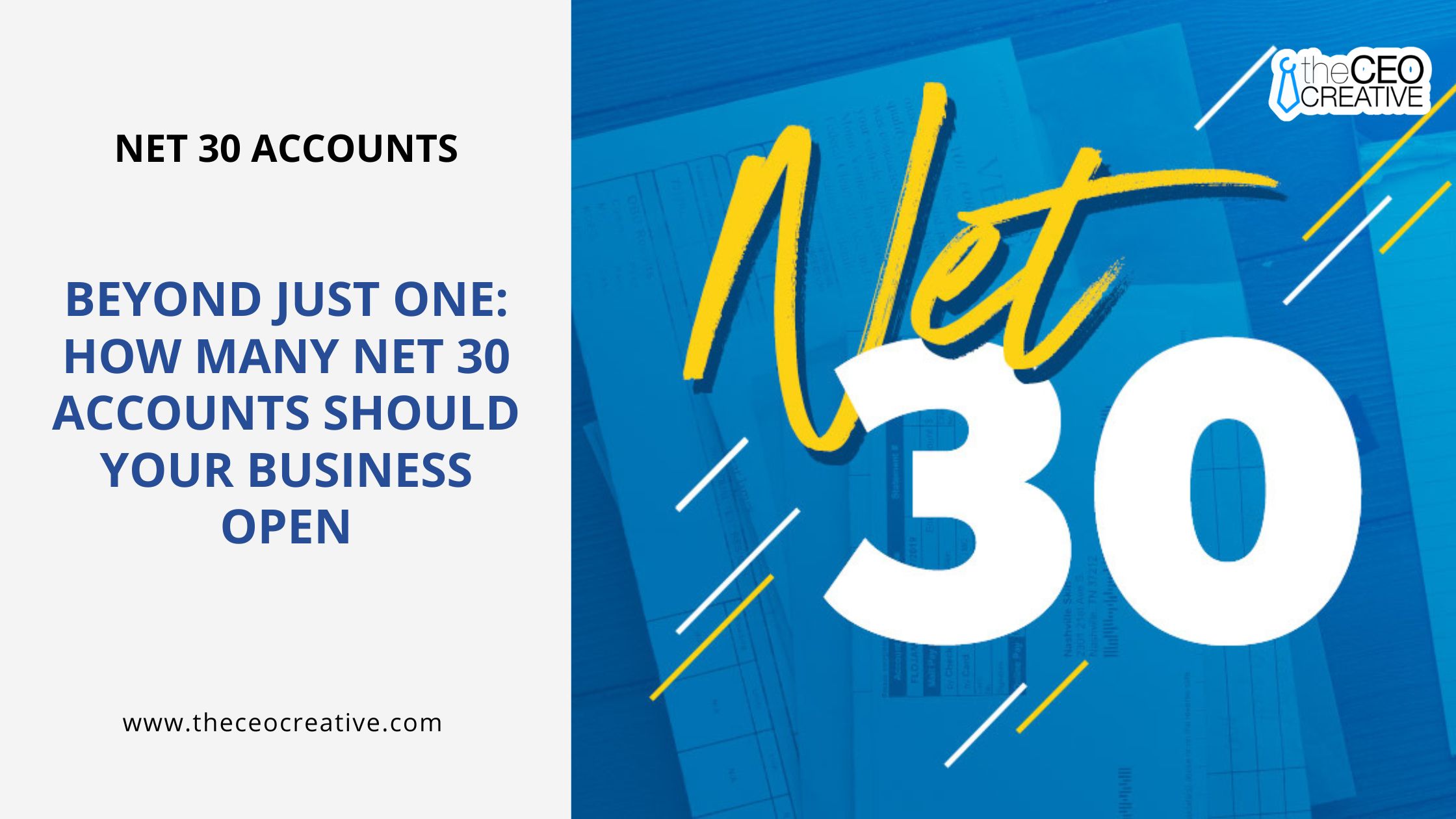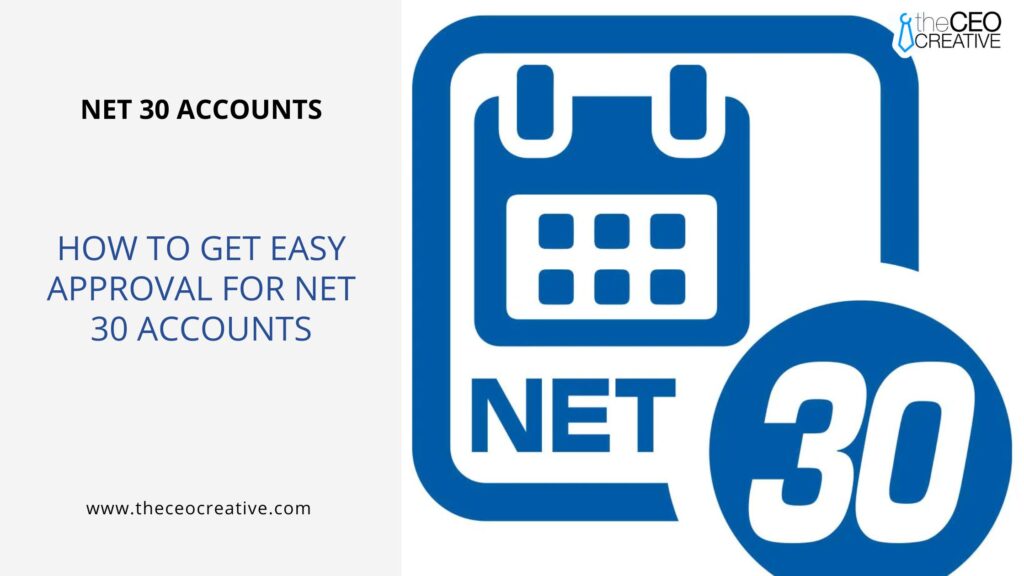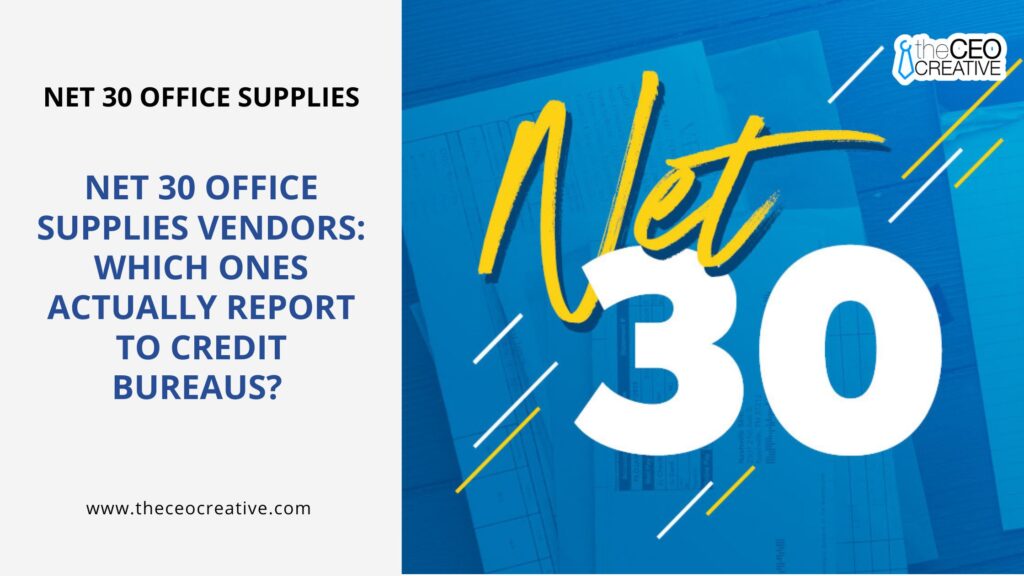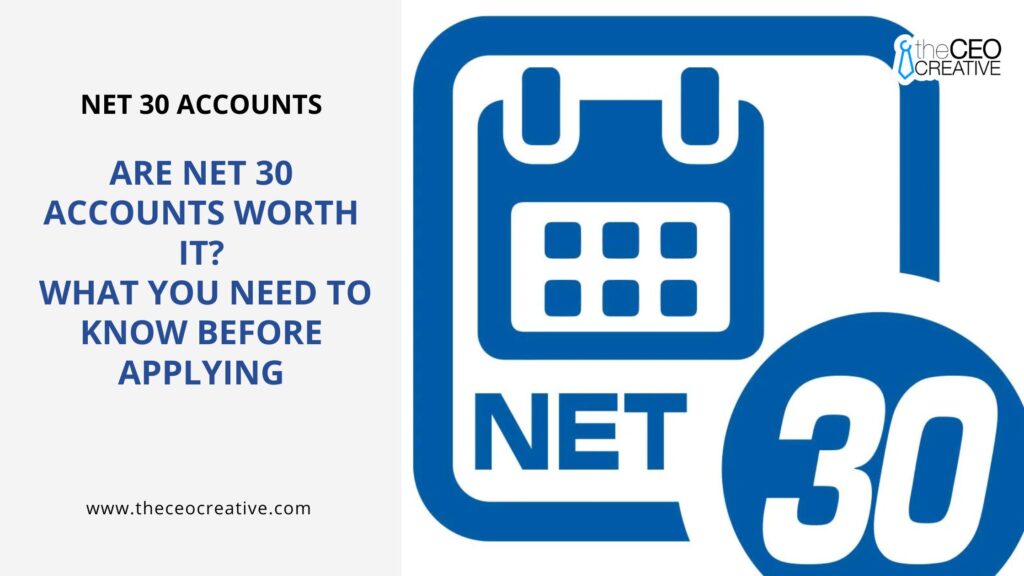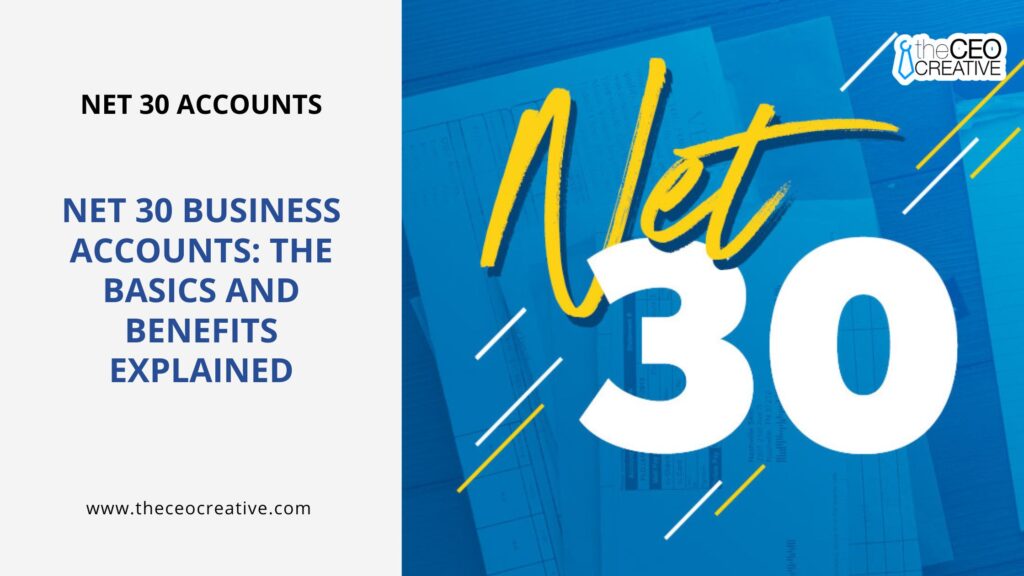Hey there, small business owner! Are you on the hunt for ways to bulk up your business credit and get that cash flow of yours flowing a bit more smoothly? If you’re nodding along, then net 30 accounts could be the answer you’ve been looking for. But hold on, how many of these accounts is the “sweet spot” for really making things shine? With net 30 accounts, you get the goods or services you need and have a whole 30 days to pay the bill in full, like a handy little short-term loan. Let’s dive into how juggling several of these accounts can do wonders for your business and pave the way to a much brighter financial future!
The Ideal Number of Net 30 Accounts for Your Business

Alright, so you’re curious about getting some net 30 accounts, but you’re not sure what the magic number is, right? That’s a really good question to ask! Figuring out how many net 30 accounts is right for your business depends on a few different things. Let’s explore some key points to help you figure out what’s best for you.
Factors to Consider
Okay, so when figuring out how many net 30 accounts your business should open, the first thing to think about is your overall credit-building plan. Every net 30 account you open becomes part of your credit history. If you make your payments on time, these accounts can really boost your business credit score. Just keep in mind that juggling too many accounts can be a lot to handle, especially if your business is still new. You don’t want to spread your money too thin or accidentally miss payment due dates.
Something else to keep in mind is how much it costs to open these accounts. Some suppliers might charge you fees or make you buy a certain amount of stuff upfront. You need to think about these costs when you’re making your plans. Can your business afford these extra costs without messing up your cash flow? Take a look at the different products and services that various suppliers provide. Go with suppliers whose products actually fit with what your business does, so you’re not just opening accounts to get credit. Remember, these accounts should really help your business.
Also, think about the size of your business and your plans for the future. Bigger businesses with a wider range of needs might find it useful to have several net 30 accounts because they need all sorts of supplies and services. On the other hand, smaller businesses might want to be more careful, starting with just a couple of accounts and adding more as they expand.
Assessing Your Business Needs
Every company is different, so there isn’t a magic number of net 30 accounts you should have. Begin by taking a close look at how your business runs right now and its financial health. Are there certain things your company buys over and over? Find suppliers who offer net 30 terms on those things you purchase frequently. This can turn your usual expenses into chances to build up your credit.
Consider your business credit objectives. If your goal is to boost your credit score fast, opening several accounts could be beneficial. It allows for a variety of positive payment experiences to be reported. But, it’s crucial that your business can keep up with the payment deadlines for each account. Missing payments will hurt your credit score, working against what you’re trying to achieve.
Additionally, think about your future growth strategy. A business that’s ready to expand needs to find a balance between what it needs right now and what it might need down the line. You may require more accounts as your company expands, but beginning with a number that’s comfortably manageable can set a strong base for the future.
Balancing Between Fewer and More Accounts
Having just a few accounts makes things easier to handle and is lighter on your wallet, but it might not help your credit as much or give you as many options. On the flip side, if you have a bunch of net 30 accounts, you’ll have more chances to build your credit and spread things out, but it could make keeping track of your finances a real headache.
For most businesses, it’s best to find a happy medium. Start with two or three accounts that match up well with what you usually buy. See how these accounts affect your cash flow, credit score, and how your business runs. Once you get the hang of managing these and your business needs expand, you can slowly add more as needed.
It’s important to check in on your accounts regularly to make sure they’re still a good fit for your goals and needs. Things change in the business world all the time, and the accounts you pick should change with them.
Advantages of Multiple Net 30 Accounts

Choosing to open multiple net 30 accounts comes with several advantages that can enhance the financial positioning of your business. Let’s delve into the benefits of diversification, trade relationships, and financial flexibility.
Diversification of Credit Sources
Think of having a bunch of Net 30 accounts like spreading your bets in a casino. You’re not putting all your eggs in one basket, right? Instead of relying on just one supplier, you’ve got options. This way, if one of them runs into trouble – say, delays or whatever – you can just jump to another without missing a beat. It’s like having backup plans to keep your business running smoothly.
Plus, juggling multiple accounts is like showing off your financial muscles. It tells banks and potential partners that you’re good for the money, that you can handle several credit lines without sweating it. And that can only help you down the road when you need a loan or want to negotiate better deals with other suppliers. You’re basically proving you’re a responsible and creditworthy business player.
Strengthening Trade Relationships
Going beyond just the upfront credit advantages, having several net 30 accounts can really help you build solid connections with your suppliers. When you regularly do business with different vendors and stick to their payment schedules, you build a reputation as a trustworthy customer. This can pay off in lots of ways, like getting special deals, being treated like a VIP, and maybe even getting to pay later.
Suppliers love having dependable customers, and when you nurture these relationships, you often get the inside scoop on new items, sales, or better payment options. Sometimes, the perks of having strong business relationships can be even more valuable than just saving money right away.
Flexibility in Financial Management
Spreading your purchases across several net 30 accounts gives you way more breathing room when juggling your money. You can smartly space out your expenses with different suppliers, really making the most of the cash you have on hand. This is super helpful, especially if your business hits a rough patch, like a slow season or an unforeseen cost that pops up.
With this kind of flexibility, you can also try out different ways of buying things and dealing with suppliers to see what fits your business best. You get to compare the deals each supplier offers, see who can give you the best prices for buying in bulk, and figure out which accounts are the most useful overall.
Spreading out your financial obligations across a bunch of accounts means you’re not putting all your eggs in one basket with any one supplier. If things shift in the market or your business runs into some snags, having lots of sources to turn to can be a lifesaver and make your financial situation much more stable.
In short, there’s no one-size-fits-all answer to the ideal number of net 30 accounts for your business. The smart move is to choose accounts strategically, considering your company’s unique requirements and growth goals. Having the right mix can lead to a wider range of suppliers, stronger connections in your industry, and improved financial agility, ultimately building a more resilient and successful business.
Potential Risks of Opening Too Many Accounts

It’s thrilling to think about improving your business credit by using lots of net 30 accounts, but you need to be careful. Even though having many accounts can be helpful, it’s really important to know about the possible dangers. If you’re aware of these risks, you can prevent problems that could actually hurt your business’s financial well-being instead of helping it. Here are some things you should watch out for:
Impact on Credit Score
Opening Net 30 accounts is basically like opening new credit lines. Every time you apply, a hard inquiry could show up on your credit report, possibly causing a small, temporary drop in your credit score. While a couple of inquiries might not do much, a bunch of them close together can really knock your score down.
Having too many new accounts opened at once can also raise red flags for lenders and creditors. They might think your business is overextending itself or, even worse, that it’s having money troubles. This could mean higher interest rates or a harder time getting loans in the future.
Plus, if you don’t handle these new accounts carefully, they can mess up your payment history. Keep in mind, your payment history is a big deal when it comes to your credit score. If you struggle to keep up with payments on all those accounts, even a few late ones can hurt your score for a long time.
Overextending Financial Commitments
Every time you open a new net 30 account, it means taking on fresh financial responsibilities. It’s super important to figure out if your business can really handle these new obligations before you commit. Here’s why pushing yourself too far financially can cause trouble:
– Running Low on Cash: Having a bunch of accounts means more bills to pay every month. If your income doesn’t match up with all these outgoing costs, you could run into cash flow problems. Cash flow is what keeps your business going, and if you don’t manage it right, you could face some really tough challenges.
– Surprise Costs: If you suddenly have to deal with unexpected expenses, having too many financial commitments can make it hard to adapt. This lack of flexibility means you might struggle to handle these surprises without either shortchanging other financial duties or taking on even more debt.
– Credit Utilization Ratio: Even though net 30 accounts usually don’t report a credit limit, opening too many can still impact your overall credit utilization and how financially healthy you appear. If creditors see lots of debts or obligations, they might see your business as high-risk.
It’s important to balance your commitments with what you can truly afford. Overextending yourself can lead to missed payments, which can severely damage your credit standing.
Managing Multiple Payment Deadlines
Handling multiple net 30 accounts brings with it the challenge of keeping track of varying billing cycles and payment due dates. Imagine this: you’ve got five different accounts, each with a unique payment deadline scattered across the month. If you don’t have a reliable method for staying organized, you could easily overlook a payment, which could result in unnecessary late fees and possible harm to your credit score.
When you’ve got multiple deadlines to deal with, it can really make things complicated. Here’s how:
– More Paperwork to Worry About: Think about it, every account comes with its own set of invoices that you need to keep track of. This means more time spent on paperwork and less time actually focusing on making your business thrive.
– It’s Easier to Make Mistakes: The more accounts you have, the more likely you are to slip up. Maybe you misplace an invoice or get a due date wrong. These kinds of mistakes can lead to missed payments, and that’s a big no-no in the eyes of creditors. It can even hurt your business’s credit score.
– It Can Be Stressful! Keeping all those deadlines straight can be a real headache, especially if you’re a small business and don’t have a lot of people to help you. Even if you’re super organized, the constant pressure to make sure everything gets paid on time can be a lot to handle.
In a nutshell, while net 30 terms can be really advantageous, it’s crucial to grasp and handle the potential downsides. By being aware of these risks and planning accordingly, you can guide your business toward better credit and consistent expansion, all without causing financial stress.
Conclusion
Getting enough net 30 accounts can really make a difference for your business. They can help improve your business credit and make cash flow better, which gives you more room to grow and handle your money. The important thing is to find a balance by using a bunch of accounts but not taking on too much. First, figure out exactly what your business needs are and slowly add these vendor accounts to increase your trade credit choices. As your business changes, check how your accounts are doing from time to time to make sure they’re still helping you reach your money goals. Don’t forget, building good relationships with vendors can open up even more chances, making it a great situation for your small business!
Frequently Asked Questions
What is a net 30 account and how does it work?
A net 30 account is a vendor credit arrangement that lets your business buy now and pay later. With net 30 payment terms, the invoice is usually due 30 days after the invoice date. If the vendor reports payments, paying on time can help strengthen your business credit profile over time. It works best when you use it for purchases you already need and can repay reliably every month.
Which companies offer net 30 accounts for small businesses?
Many vendors that offer net 30 are in business essentials like office supplies, shipping supplies, packaging, and services. The “best” company depends on what you buy frequently and whether you want reporting for credit building. Some businesses prioritize reporting vendors, while others prioritize convenience and consistent inventory. Before applying, confirm the vendor’s requirements, product fit, and whether there are any fees.
How do I apply for a net 30 account online?
Start by making sure your business info is consistent everywhere (EIN, business name, address, phone). Then apply through the vendor’s online application and match details exactly to official records. Some vendors may verify your business status or require an initial purchase to activate the account. If you want easy net 30 accounts, look for clear requirements and straightforward signup steps.
Top net 30 account services that report to credit bureaus?
The top value comes from net 30 accounts that clearly report payment history to business credit bureaus. Before opening multiple accounts, verify reporting details and how soon reporting starts after activity.
A reporting tradeline can matter more than having many non-reporting accounts you rarely use. Pick a few reporting vendors you can pay early or on time, then expand only when it’s manageable.
Can I use a net 30 account to build business credit?
Yes—net 30 accounts can help build business credit when payments are reported and made on time. Think of each reporting account as a tradeline that can contribute to your credit profile over time. The key is consistency: late payments and missed invoices can hurt more than extra accounts help. Start with 2–3 accounts, prove consistent on-time behavior, then scale up strategically.
Are there any fees associated with net 30 accounts?
Some net 30 accounts are free, while others charge annual fees, membership fees, or setup costs. Certain vendors also require minimum first orders or ongoing purchases to keep the account active. Late fees may apply if you miss the due date, which can erase the benefits of the account quickly. Always review terms before applying so the account supports cash flow instead of creating new stress.
How to find net 30 accounts that offer early payment discounts?
Look for invoice terms like “2/10 net 30,” which can offer a discount for paying within 10 days. These discounts can be great if your cash flow supports early payment without causing shortages. Ask vendor support directly if early-pay incentives exist and how they appear on invoices. Use discounts strategically—don’t force early payments if it risks missing other critical bills.
How to close or cancel a net 30 account?
First, pay any outstanding invoices and confirm your account balance is $0. Then request closure through the vendor’s support channel (email or portal) and keep confirmation.
Ask whether closure changes reporting or if the tradeline remains visible on your reports. Monitor statements afterward to ensure no surprise charges or recurring fees appear.
How to get approved for a net 30 account with no credit history?
Start with vendors that are friendly to newer businesses and have clear verification steps. Keep your business identity consistent (EIN, address, phone, listings) to avoid approval delays. Place a small first order you can pay early to establish positive payment behavior quickly. If you’re targeting net 30 accounts for instant approval, remember “fast approval” only helps if you can still pay on time and track due dates.

